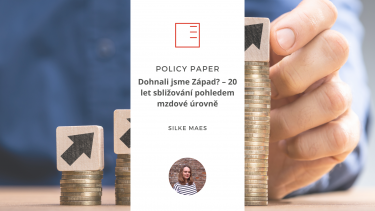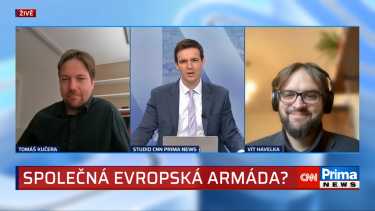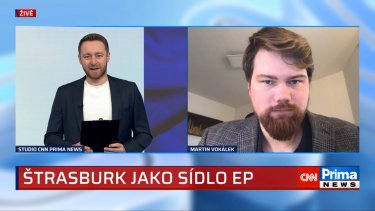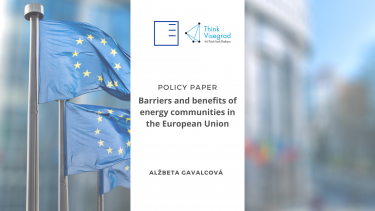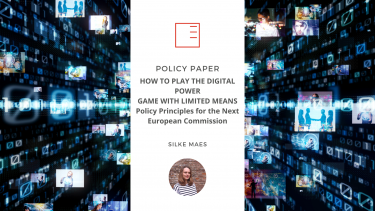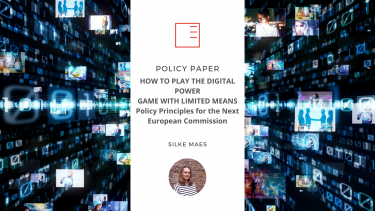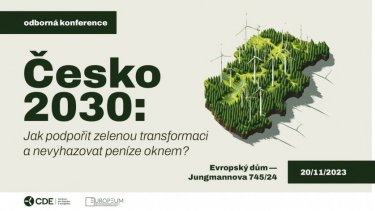Policy paper | Have we caught up with the West? - 20 years of convergence through the lens of wage levels
This year, the EU marks the anniversary of the biggest wave of enlargement in its history, when the Czech Republic joined the Union along with nine other Central and Eastern European countries. One of the main promises associated with enlargement was that the new Member States would catch up with Western Europe in terms of living standards. Read more in Silke Maes' policy paper.
Zjistit víceCNN Prima News | The European Army and the position of the Defense Commissioner
The next European Commission should have a new Commissioner for Defense. There is speculation that this position could go to the Czech Republic. However, some European politicians, such as French President Emmanuel Macron, are calling directly for the creation of European army. But what are the pitfalls of the project? Vít Havelka, a research fellow at EUROPEUM Institute, talked about the usefulness and possibilities for CNN Prima News.
Zjistit více
CNN Prima News | Two plenary session locations of the European Parliament
The MEPs discussed the difficulty of changing the seat of the European Parliament, which periodically moves from Belgium to France. Most agreed that they would welcome if this movement was canceled. However, France would probably veto such a change in the treaties. What are the arguments for and against moving the European Parliament periodically? Is there any way out of this problem, or will Strasbourg's role remain the same for decades to come? Martin Vokálek, Director of EUROPEUM Institute for European Policy, commented for CNN Prima News on the issue.
Zjistit více
Policy Paper | Barriers and benefits of energy communities in the European Union
Energy communities are an effective means to decentralize and renew our energy systems with sustainable solutions as they are usually based on renewable energy. They have already started emerging in 1970´s, yet there has been a significant increase in their development only in recent years, also in terms of their introduction into the EU legislation. Especially in Western and Northern European countries the concept already enjoys vast popularity. On the other hand, in Central and Eastern European countries (further referred to as CEE) energy communities are only beginning to emerge. The policy brief (based on literature and interviews with various stakeholders ) examines the benefits energy communities may bring, and more importantly, the main obstacles remaining in their way for greater evolution in the CEE region – and especially Visegrad countries (V4). As these initiatives progress, sharing the best practices will ensure the success of the community energy in the energy transition. Writes Alžbeta Gavalcová.
Zjistit vícePolicy Paper | Barriers and benefits of energy communities in the European Union
Energetické komunity jsou účinným prostředkem decentralizace a obnovy našich energetických systémů pomocí udržitelných řešení, protože jsou obvykle založeny na obnovitelné energii. Začaly se objevovat již v 70. letech 20. století, avšak k jejich výraznému rozvoji došlo až v posledních letech, a to i z hlediska jejich zavedení do legislativy EU. Zejména v zemích západní a severní Evropy se tato koncepce již těší velké oblibě. Naproti tomu v zemích střední a východní Evropy (dále jen SVE) se energetická společenství teprve začínají vytvářet. Tento politický brief (založený na literatuře a rozhovorech s různými zúčastněnými stranami ) zkoumá výhody, které mohou energetická společenství přinést, a především hlavní překážky, které jim stále stojí v cestě k většímu rozvoji v regionu střední a východní Evropy - a zejména v zemích Visegrádské skupiny (V4). Jak tyto iniciativy postupují, sdílení osvědčených postupů zajistí úspěch komunitní energetiky v energetickém přechodu. Píše Alžbeta Gavalcová.
Zjistit vícePolicy Paper | HOW TO PLAY THE DIGITAL POWER GAME WITH LIMITED MEANS Policy Principles for the Next European Commission
In the global competition for technological dominance, this policy brief sets out six principles for the next Commission on how to play the digital power game with limited resources. Despite the size of its market, the EU lacks common fiscal capacity, capital markets and labour market dynamics. Writes Silke Maes, Research Fellow at EUROPEUM Institute.
Zjistit vícePolicy Paper | HOW TO PLAY THE DIGITAL POWER GAME WITH LIMITED MEANS Policy Principles for the Next European Commission
Svět se nachází v horké fázi globální soutěže o nadvládu v nových technologiích. Pokud chce EU zůstat do budoucna konkurenceschopná, musí být více aktivní. Jak na to rozebírá náš nejnovější policy paper z pera výzkumné pracovnice Silke Maes. Navrhuje v něm šest konkrétních kroků pro novou Evropskou komisi vzešlou z voleb do EP v roce 2024.
Zjistit víceCzech Republic 2030: How to support green transformation and not throw money out the window?
On 20 November 2023, the Centre for Transport and Energy, in cooperation with EUROPEUM Institute for European Policy, organised a conference entitled Czech Republic 2030: how to support green transformation and not throw money out the window? The conference was opened with an introduction by Josef Schwarz from the Representation of the European Commission in the Czech Republic.
Zjistit víceiDnes.cz | What exactly is in the migration pact
The European Union has approved a migration pact, and from 2026 individual states will either accept their share of refugees or pay to opt out of this obligation. However, since the Czech Republic has already accepted a large number of refugees since the outbreak of the war in Ukraine, it should temporarily be exempt from this obligation. However, as noted by Viktor Daněk, deputy director of the Institute for European Policy EUROPEUM, this is not an exemption explicitly granted to Czechia. Exemptions are determined based on the number of people granted asylum or similar protection in a given country.
Zjistit víceDvacet minut Radiožurnálu | Summit in Brussels: Ukraine needs investment in offensive capabilities
At Brussels, on April 17th and 18th, an extraordinary summit of European Union took place. Originally it was intended to focus on enhancing the bloc's competitiveness, but the agenda of the meeting shifted towards discussing military support for Ukraine, and the situation in the Middle East. Viktor Daněk, deputy director of the Institute of European Policy EUROPEUM provided analysis on the topic for a daily episode of Dvacet minut Radiožurnálu.
Zjistit víceStaroměstské náměstí 4/1
Praha 1 - Staré Město
110 00
tel.: +420 212 246 552
email: europeum@europeum.org
https://www.europeum.org
